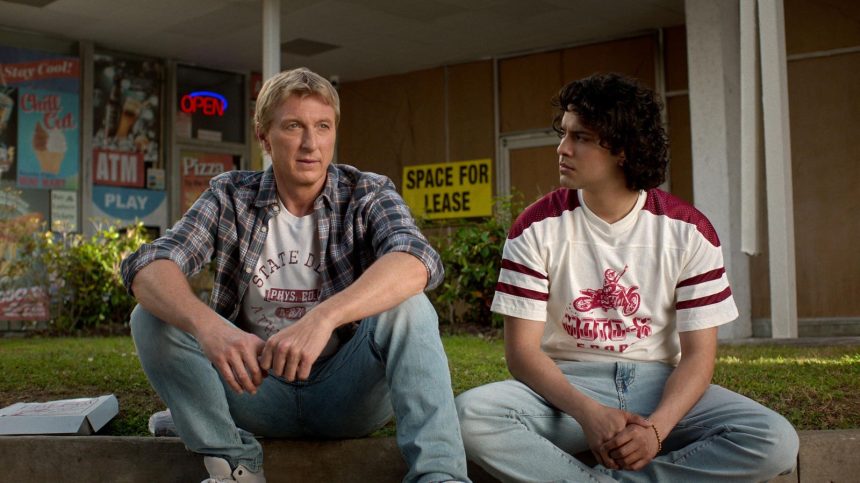Cobra Kai, the popular sequel series to the iconic Karate Kid films, is drawing to a close with its sixth and final season, concluding its run in early 2025. The season has been divided into three parts, with the first two installments released in July and November of 2024, respectively. The concluding third part is slated to premiere on February 13th, 2025, a date inadvertently leaked by Netflix and later confirmed. The series finale will precede the theatrical release of Karate Kid Legends in late May 2025, a film that marks a significant departure from the Cobra Kai narrative.
Season 6, like its predecessors, offers a mixed bag of highs and lows. While the series has maintained its engaging core, it has also suffered from narrative stretching, prolonging character arcs beyond their natural conclusion and introducing a revolving door of often over-the-top antagonists to maintain audience interest. Part 2, set in the vibrant backdrop of Barcelona, brought a refreshing change of scenery, showcasing familiar landmarks and providing a welcome escape from the Californian setting. The Sekai Taikai tournament added another layer of excitement, despite the recurring trope of excessively aggressive competitors and their equally volatile senseis. However, the season stumbled in its final episode, culminating in a tragically toned ending preceded by one of the series’ most outlandish fight sequences.
Despite the unevenness of the penultimate part, anticipation remains high for the concluding installment. The unconventional release strategy adopted by Netflix, however, has drawn criticism. Dividing the season into three parts, released over an eight-month period, has disrupted the narrative flow and diluted the momentum and audience engagement typically associated with a more concentrated release schedule. Alternatives, such as weekly releases of three episodes over six weeks, would have arguably maintained a better balance between the binge model and a more traditional episodic format. This prolonged release schedule stands in stark contrast to the more conventional weekly or binge-release models typically employed by streaming platforms.
The upcoming Karate Kid Legends film marks a significant departure from the Cobra Kai series, retaining only Ralph Macchio’s Daniel LaRusso from the original cast, alongside Jackie Chan and newcomer Ben Wang. While this shift in focus is understandable from a narrative perspective, it inevitably leads to the absence of beloved characters who have become integral to the Cobra Kai universe. Most notably, the absence of William Zabka’s Johnny Lawrence and Xolo Maridueña’s Miguel Diaz, considered by many to be the heart and soul of the series, will undoubtedly be felt by fans. Their complex dynamic and compelling character arcs have been central to the series’ emotional core, and their absence marks a significant shift in the franchise’s direction.
Cobra Kai’s extended final season has provided a platform to explore the multifaceted lives of its ensemble cast, delving deeper into their individual struggles, rivalries, and personal growth. While the series occasionally succumbs to the pitfalls of narrative bloat and over-the-top villainy, it consistently delivers compelling character-driven moments and thrilling martial arts action. The Barcelona setting in Part 2 injected a welcome dose of freshness into the familiar formula, offering a visually stunning backdrop for the international tournament. However, the concluding episode of Part 2 took a sharp turn, ending on a somber note following a fight scene that bordered on the absurd.
The anticipation for Part 3 is palpable, as fans eagerly await the resolution of ongoing storylines and the ultimate fate of the characters. The unconventional release strategy employed by Netflix has undoubtedly influenced the audience’s experience of the final season, potentially impacting the overall reception of the series conclusion. The extended hiatus between parts creates a disjointed viewing experience, potentially diminishing the impact of crucial plot developments and emotional climaxes. The decision to deviate from a more traditional release model remains a point of contention, raising questions about the optimal approach to delivering serialized content in the streaming era. The upcoming Karate Kid Legends film, while promising a fresh chapter in the franchise, represents a clear departure from the Cobra Kai narrative, leaving behind the ensemble cast that has captivated audiences for six seasons. The absence of key characters like Johnny Lawrence and Miguel Diaz underscores the significant shift in direction, leaving fans to ponder the future of the Cobra Kai universe and the legacies of its beloved characters.



